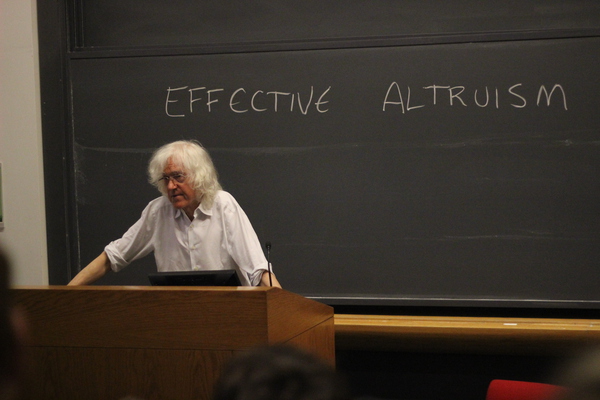Over his storied career, Derek Parfit, the English moral philosopher, spent plenty of time waxing poetically about a mode of thinking which almost all of us pursue, but that few of us pursue knowingly. At the dawn of the 21st century, neuroimaging techniques like the fMRI allowed us to glimpse how the brain reacts to certain stimuli. Scientists discovered that when patients focused on who their future selves would be like, conditions in a part of the brain called the Mesial Pre-Frontal Cortex changed to those which appeared when they thought of distant acquaintances or strangers.
This became a vitally important observation for the fields of neuroscience, psychology, and philosophy. Since we view ourselves in the future, according to Parfit who played with this concept before the fMRI revelations, as multiple strangers often unhindered by the burdens of the individual’s present state, the personal accountability to behave in a way that benefits the individual in the present, as well as the many more versions of that individual across time – one’s community of selves – diminishes.
If one were to take the next few days as an experiment and mark down in a journal every time they try and “bargain” with a future-self they might get a better idea of how common it is to behave this way.
This is a special ability we homo-sapiens possess called high-order abstraction. It’s a very advantageous evolutionary tool that allows us to plan out the future. For example, if you are a wide-ranging hunter-gatherer on the African weald and you see an insect which you think might make a good snack, you can create an abstraction to help you decide whether insect is on the menu. In concept, you create in identical, fictional world in your mind where you go and eat that insect.
Within this fictional world you can make all kinds of inferences, for instance, will it bite or sting me? Maybe during the abstraction you infer evidence based on past interactions with similar insects. The abstraction came to an end when your abstraction-self died as a result of fiddling with a dangerous insect. Yet the organism lives on to find other sources of food, safe in the knowledge that scorpions are too dangerous to handle.
Two Minutes To Midnight
In 1985, a study was conducted on 4872 young, multi-racial, American adults between the ages of 18-30, taking 1 year to finish with 26 years of follow up. In a corresponding paper released in 2016 based on the same data, the researchers found that every additional minute of cardio-respiratory fitness training performed above the baseline amount of work established at the beginning of the 1985 study, added a 15% reduction in risk of death and cardiovascular disease events such as a stroke during the 26 years of follow up.
Almost as significant, during the initial 7 years of the study each 1-minute decrease resulted in a 20-21% increase in the risk of death and cardiovascular disease.
It represents a stunning demonstration of the benefits one can accrue by attempting to treat one’s future community’s needs as equivalent to the needs of the present individual. In contrast, the dangers of abusing that relationship are just as significant.
However, planning for the future can be very different across multiple dimensions. This example of health neatly demonstrates the challenges which arise as a result of bloat in the modern medical system.
Certain examinations in the average length of a visit to one’s primary-care provider indicate very limited amount of time for anything beyond immediate health concerns. A 25-year old curious about his future risk for Alzheimer’s is not going to get much in the way of help from his doctor, and would likely have to visit a specialist.
If he doesn’t have time to make such an appointment, or if a specialist isn’t covered under his medical care, he may miss out on the fact that sleep when you’re young contributes massively to the state of neuro-plasticity as an adult.
An attending or primary-care physician is a very challenging occupation, and with some seeing as many as 1000 patients a week, it’s no wonder the average visit is so short – nor is it any reason to place blame. In a country such as the United States where healthcare costs can be so high, it often falls on the individual to take action for long-term health planning.
Therein lies the challenge, especially if in our delusions we believe the possible afflictions of the future as befalling a different person (even though we are the ones who’ll have to live with them). This phenomenon is not restricted to the world of medicine and health, but also appears is finance.
The Critical Epoch
Described as “temporal discounting,” individuals value short-term gains over long-term investment. There is no indication of changing attitudes towards temporal discounting even considering the modern increase in life span, and the state of rapid innovation within the realm of medicine. Recently, HIV was sent into complete remission by a British doctor, and last year’s Nobel Prize winners went to a team of scientists – the developers of immune-checkpoint therapy – a profound measure for cancer prevention.
Regardless of whether an individual can live to be 100, most people, as the study suggests, are more incentivized by short-term acquisitions. Returning to the idea of preventative medicine, it’s absolutely crucial to break down the barriers between one’s current self, and the procession of future selves they will grow into if they expect to live a long and healthy life.
Investing your time into healthy sleep strategies is a good way to take care of your future selves, as we know Alzheimer’s and other neurodegenerative diseases are strongly linked to a buildup of plaque in your brain which is cleared away during deep, slow-wave sleep cycles carried out during the first half of the night. Time spent in this state of sleep, as the study shows, drops as we age; increasing the need for slow-wave sleep cycles in young populations.
The World Health Organization has classified nighttime shift work as a cause of cancer, due to the significant drop in immune-cell production resulting from sleep deprivation.
Unfortunately, our entire American school system, from grades 6 to post-doc or graduate school, tends to promote sleep deprivation, and is set up in a way that limits the opportunities for implementing good, healthy sleep patterns at the precise time when young people are building foundations of health to last the rest of their lives. Plenty of studies have shown that the benefits of later school start times reach everything from test scores to car collisions.
Furthermore, the massive increase in school tuition over the last two decades ensure that our already beaten-down youth are straddled with inescapable debt in the rather short window of opportunity when they are able, socially or otherwise, to take entrepreneurial risks.
It requires a decent amount of capital to start a promising small business, and while loans given against credit move with the health of the market, as shown in a study done this February, student tuition costs move ever-upward; unabated even in the face of the 2008 financial crises. If a young man or woman is in the whole 42,000 dollars from school, what security do they have to take a risk starting a business? What opportunity do they have to put a thousand dollars away every year in savings?
In conclusion, between school, health, and finance, the only institution with a demonstrable ability to take care of an individual’s long term well-being is said individual.
A truth we can observe is far easier to believe in than a truth we cannot, and so the boundaries between the present-self and the future-selves must be shattered if one is to fortify their health in a way that assists the “them” that exists 50-70 years in the future.
In this vein the inference on the work of the medical researcher comes to an end; replaced instead with the work of the philosopher and the psychologist. Jordan Peterson, Derek Parfit, and David Hume all explored the temporal boundaries of the self extensively, and if one were interested in learning more, their works should make for a great place to start.
April 21st 2015: Derek Parfit (1942 – 2017) the English Philosopher delivers a lecture at Harvard University 2 years before his death.




